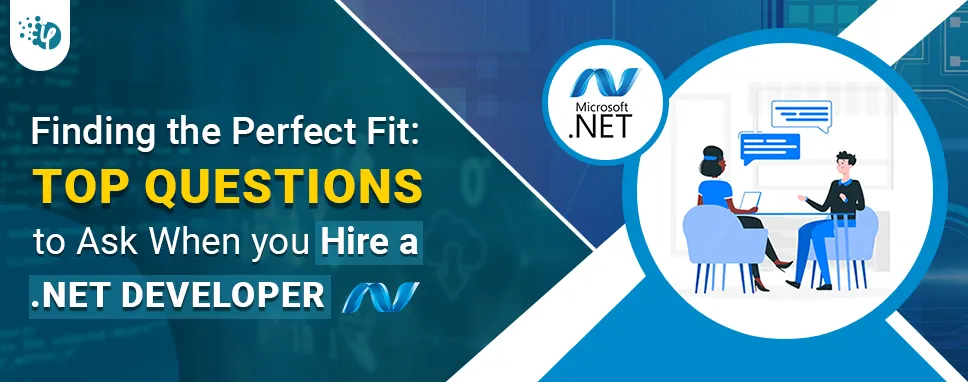How to Do Forecasting in Power BI (Steps & Accuracy Metrics)
Remember our last guide - Power BI forecasting? It revealed things that truly blocks accuracy, both structural and situational. Now it's time to take the next step. Knowing Power...
Listening is fun too.
Straighten your back and cherish with coffee - PLAY !

Do you know DOT NET Core is the ninth-best programming platform with over 6 million adoptions worldwide. Despite the daily introduction of new technologies, maintaining one’s ranking in the list of top ten is no less than fantastic.
DOT NET developers are in great demand right now, and everyone is aware of the reasons. But with so many companies out there, how will you ensure you're selecting the right one to hire .NET developers ?
Worry not! We will walk you through the major questions to ask before hiring Microsoft.Net developers.
Any organization may find it difficult to hire right .NET developers. This is because it takes a lot of effort — from checking technical knowledge to comprehending organizational culture and objectives.
You should cover all bases when interviewing potential DOT NET Core developers, from technical expertise to communication abilities.
The questions listed below might help you choose the ideal candidate for your project.
A candidate might mention experience with open-source .NET projects or contributions to the .NET community, which displays initiative and passion for the field.
Instead of Entity Framework, a developer might mention experience with other ORMs like NHibernate or Dapper. This suggests versatility and the ability to adapt to different tools.
Rather than a standard work project, a candidate might describe a personal project or a challenging hackathon problem they solved using .NET. This showcases a love for coding beyond the confines of a job.
A candidate might express proficiency in F# or VB.NET instead of C#. This can show that they have a broader understanding of the .NET ecosystem.
A developer might talk about an innovative testing or debugging method they've invented or adopted, indicating creativity and a proactive approach to problem-solving.
Some developers might mention unconventional methods like pair programming or mob programming, which can help produce clean, maintainable code and foster team collaboration.
A candidate might share an instance where they integrated ASP.NET with non-Microsoft technologies, showing a willingness to blend different technologies to achieve the best results.
A candidate could share the experience with other project management methodologies like DevOps or Kanban, indicating a broad understanding of team collaboration strategies.
Rather than a typical answer about accepting feedback graciously, a candidate might discuss how they seek out criticism proactively, showing a strong drive for self-improvement.
Beyond reading blogs and attending conferences, a developer might talk about networking with other .NET developers or contributing to open-source projects to stay updated.
Reason: This question tests the candidate's expertise and knowledge of .NET technology. More experience means a deeper understanding of technology and its best practices.
Reason: It's important the developer has experience with projects like yours. This shows they can handle the specific requirements and challenges of your project.
Reason: .NET has frameworks and libraries. Knowing which ones, the developer used can tell if they have the skills and experience needed for your project.
Reason: Testing and debugging are important in software development. Watch the candidate's approach to identifying and fixing issues to see how well they handle problems and how detail-oriented they are.
Reason: Version control and collaboration tools, like Git and Jira, help you develop efficiently and organize your work. So, you need to assess the candidate's familiarity with these tools to make sure your team can work together well.
Reason: This question tests the candidate's expertise and knowledge of .NET technology. More experience means a deeper understanding of technology and its best practices.
Reason: The technology landscape changes quickly. Developers need to keep up. Candidates who show they're willing to learn and follow industry trends demonstrate they're committed to professional growth.
Working with numerous frameworks, libraries, and tools is common during .NET development. Ask about the candidate's experience with frameworks and tools, such as ASP.NET, Entity Framework, LINQ, or Azure, to make sure they are knowledgeable on the technologies required for your project. Ask them about their degree of expertise, the scope and difficulty of the projects they have managed using these technologies, and any noteworthy successes or difficulties they have faced. This data will be used to assess their capacity to use these tools efficiently for your project.
Even if a candidate might have .NET development experience, it's important to determine whether they have experience with projects like yours. Inquire about previous initiatives that utilized comparable needs, business sectors, or technological advancements. Ask them about their responsibilities and roles in those projects, as well as how they contributed to the success of the whole thing. This can give you an idea of how well they can deal with the particular difficulties, intricacies, and nuances associated with your project.
For you to evaluate a candidate's skill and suitability for your project, you must be aware of their experience. NET. Ask them how long they have worked with .NET and how familiar they are with the framework in general. Ask them about the kinds of projects they have worked on as well as their precise duties and roles within those initiatives. This will show you how extensive their experience is and whether it meets the needs of your project. Asking about any .NET development-related qualifications, training, or courses they have taken will also help you determine how serious they are about their career advancement.
Troubleshooting and resolving problems that occur during development should be a skill for .NET developers. Ask the candidate about their approaches to problem-solving and debugging in the .NET environment. Inquire about their methods for handling unexpected failures, improving code efficiency, and locating and repairing problems. Their responses will demonstrate their aptitude for problem-solving inside the .NET ecosystem and their capacity to navigate through complex codebases and think analytically.
Effective teamwork and communication are frequently essential to the creation of successful software. Inquire about the applicant's prior experience working in teams, both locally and remotely, as well as their preferred channels of communication. Ask them if they have experience working with stakeholders, project managers, and other developers. Look for signs of good interpersonal abilities, such as the capacity to speak clearly and concisely about complicated technical subjects, to actively listen to others, and to modify their communication style to fit various audiences. How effectively they can fit into your current team and work environment will be determined by how well you can evaluate their collaboration and communication skills.
John Sanei, Founder of John Sanei Inc says “Asking each of the following important questions will help you determine a.NET developer's fitness for the job before you hire them for your project. As a reputed business strategist, I am aware of the relevance of these factors in determining the best-qualified developer for the success of your project.
Employers might gauge a candidate's level of expertise and familiarity with the.NET framework using this question. It would give a glimpse into their previous work, the technology they used, and the intricacy of the solutions they delivered.
Moreover, comprehending his/her experience can help you decide the right fit for your business project.
You may evaluate a developer's code quality, problem-solving skills, and understanding of recommended practices for .NET programming by asking for examples of their prior work. Looking at work samples or a person's portfolio may reveal a lot about their skill level, coding style, and level of attention to detail.
The answer to this question demonstrates the applicant's commitment to continuing education and adaptability. Look for candidates who are committed to lifelong learning, who attend relevant conferences or webinars, who engage with developer communities, or who make contributions to open-source projects. By following the latest .NET trends, they may leverage the newest features and development best practices.
These are the critical questions contributing to the success of your .NET development project.
Everyone has their own perspective for anything. Rajeev Bera, the Founder of aCompiler says – “It is truly important to learn the candidate’s ability before hiring them on board. Try asking the following questions:
Reason: This determines their familiarity with the different versions of .NET, which is essential for your project's specific requirements.
Reason: Quality assurance is key in development. Understanding their methods can predict the quality of their work.
Reason: Performance optimization is essential for user experience, and scalability is crucial for growing applications.”
Everything can be understood through experience, no matter whether it is business or software development. Brenton Thomas, the Founder of Twibi says – “You may determine whether a candidate is a good match for the position by asking them the following five questions.
This question will help me to assess the developer's skills and knowledge of the .NET platform. I would like to know how long they have been working with .NET, what technologies they are familiar with, and what projects they have worked on.
This question will help me to understand the developer's strengths and weaknesses. I would want to know what they are good at, what they are not so good at, and what they are willing to learn.
This question will help me to understand the developer's long-term goals. I would want to know what they want to achieve in their career, and how they plan to achieve it.
This question is important to ask to avoid any surprises later on. I would want to know what the developer is expecting to earn, and whether their expectations are realistic.
This question will help me to understand why the developer is interested in the position. I would want to know what they are looking for in a job, and why they think they would be a good fit for this position.
Encapsulation is one of the four core aspects of object-oriented programming, and it refers to the practice of incorporating an object's required functions and data into the object itself. Candidates for .NET jobs should be prepared to respond to this type of question by explaining how encapsulation protects sensitive information by enclosing it in an object.
Encapsulation can also be thought of as hiding the state of an object so that it remains secret or secure. The internals of an object is shielded from the rest of the program in accordance with this information-concealing principle. This is helpful because it reduces the possibility that external objects may be able to affect the object in question's state or behavior.
The use of an abstract class as a foundational class is ubiquitous. Inheriting entities are responsible for implementing a few abstract/virtual members, and a portion of the functionality is partially implemented. Candidates should highlight the fact that this class can define fields for additional consideration. Objects of this type cannot be created by developers. However, an interface can only declare methods, events, and properties (no access modifiers). All declared members should be implemented by the developer. In a nutshell, an interface specifies the expected behavior of classes that implement it.
In object-oriented parlance, inheritance refers to the process by which one class can be used as a basis for another, with the derived class acquiring some or all of the characteristics of the parent class. Developers can make a class Vehicle, and then subclass it to make classes Truck, Car, and Motorcycle, all of which share the same functionality. Candidates can show they grasp the issue and the framework by mentioning that .NET only allows classes to inherit from a single-parent class. The transitive nature of inheritance may also factor into their response; for instance, the Ford class inherits features from the Car class, which in turn inherits features from the Vehicle class.
Choosing the right developers these days is like finding rare gems in a vast digital minefield. These days, picking the appropriate developers is like stumbling upon priceless pearls in a huge digital minefield. It takes a lot of work to become a DOT NET developer, and proficiency in fundamentals like SQL, API testing, C#, and Visual Studio is important. The key queries you should ask DOT NET developers before hiring them for your project have been covered in this article. With this, you will get a glimpse of the candidate's expertise and make an educated choice as a result.

Remember our last guide - Power BI forecasting? It revealed things that truly blocks accuracy, both structural and situational. Now it's time to take the next step. Knowing Power...

Security has always been a major concern. Your company spends millions on cybersecurity tools, and guess what? You’re still vulnerable. When you're working in the cloud, especially...

Automation isn’t just a trend anymore. It’s a must-have for any business relying on the Cloud. As the firm grows, cloud infrastructure gets more complex. So, choosing the right Infrastructure...